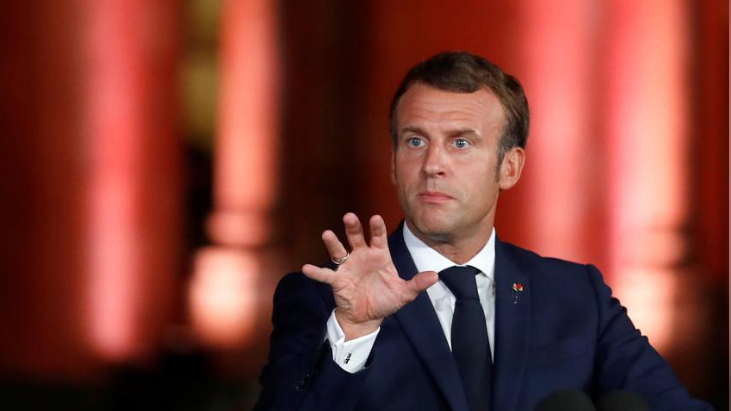
by CGTN with input from AFP – Reuters —French President Emmanuel Macron said on Tuesday Lebanese political leaders had agreed to form a government of experts in the next two weeks and that he expected the government to start delivering on a roadmap of reforms within six to eight weeks. “There is no blank check,” Macron told a news conference in the Lebanese capital. If reforms, including an audit of the central bank, were not being passed within that deadline, international aid would be withheld, he added. Macron was in Beirut for a second time since an August 4 explosion which killed more than 180 people, laid waste to entire city districts and fuelled popular rage against the country’s political elite. He attended muted celebrations marking the centenary of Greater Lebanon, shortly after political leaders settled on a new prime minister, Mustapha Adib, to form a cabinet and lead the country out of political turmoil and an economic crisis that was already crippling the country before the portside blast. “What all political parties without exception have committed to this evening right here, is that the formation of this government will not take more than 15 days,” he said.
Macron set himself an ambitious goal for his return visit: to push for deep change, but without being seen as meddling in the former French mandate. “This is the last chance for the Lebanese system,” he warned earlier. “It’s a risky bet I’m making, I am aware of it… I am putting the only thing I have on the table: my political capital,” he told news website Politico. Macron spoke to the press after meeting top Lebanese politicians, while clashes erupted in central Beirut between security forces and protesters rejecting the new prime minister. One held a poster aloft urging Macron: “Do not cooperate with the corrupt and criminal.” The French leader arrived Monday, just hours after Adib, a little-known 48-year-old academic and former ambassador to Germany, was designated to form a government. (With input from AFP, Reuters)
by Bloomberg — Ania Nussbaum and Dana Khraiche — French President Emmanuel Macron said Lebanon’s political leaders will have until the end of October to show they are prepared to tackle their problems and deserve the international aid flooding into the country. At a press conference in Beirut following a day of meetings with Lebanese officials, Macron said that Premier-designate Mustafa Adib will have two weeks to form a government charged with implementing a widespread roadmap to get the country back on its feet after years of economic and political turmoil that culminated in last month’s devastating explosion at the port of Beirut. Macron said that the reform program has the backing of all political groups in the country and stipulates that the incoming administration will have a month to get started. It will then be expected to report back to international donors. If there is no movement, “I will tell the international community that we can’t help Lebanon but also explain to the Lebanese people that your leaders decided it would be so,” Macron told reporters. “It’s time for Lebanon and its authorities to draw the lessons from the tragedy.”
Macron didn’t rule out sanctions eventually.
Macron was the first international leader to visit the Lebanese capital a month ago and is attempting to act as what he calls an “honest broker” between the embattled country and the international community, which is awaiting a reform of the banking and political systems before loosening the purse’s strings. Many locals said they see him as the country’s last hope, after years of entrenched corruption and cronyism brought the economy to its knees.
‘Real Pragmatist’
But the risk is that the French president is seen as endorsing a political elite that’s reluctant to give up its power. “I’m a realistic idealist,” he said. “That is, a real pragmatist.” France has pushed for reforms in the banking sector, primarily an audit of the central bank, the ailing electricity sector and for a public procurement law. The International Monetary Fund wants Lebanon to unify the multiple exchange rates, restructure mounting debt and a capital control law. The French leader disputed reports in local media that Adib, the Lebanese ambassador to Germany, was his pick for prime minister. Adib was named by the major political parties, who protesters say have been clinging to power and blame for decades of corruption and mismanagement.
During his first visit to Lebanon, two days after the blast that was caused by ammonium nitrate stored at the Port of Beirut, Macron met with political leaders from across the spectrum — including Iran-funded Hezbollah. He urged them to implement a raft of reforms to help unlock billions of dollars in assistance from around the world. “Undoubtedly Hezbollah is present in parliament because there is intimidation and it’s playing on its ambiguity” — a reference to Hezbollah’s terrorist and political activities — “But also because your leaders haven’t been able to lead well,” he added. “I’m trying not to get bogged down in principles.” Macron said there will be an international conference in Paris in the second half of October, in parallel with a UN aid conference. The French president pledged to come back to Beirut in December to monitor progress. Paris co-hosted with the United Nations an online meeting in the aftermath of the Aug. 4 explosion that drew $300 million in disaster relief. Yet the blast, which killed more than 180 people and injured thousands, is estimated to have caused as much as $4.6 billion worth of damage. France has hosted a number of international aid conferences for Lebanon since the end of the 1975-1990 civil war. The country ruled Lebanon until independence in 1943.



